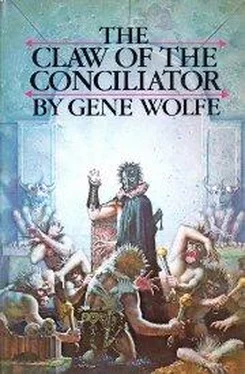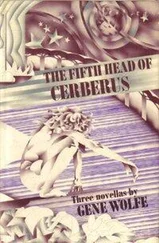“Close eyes, all of you… There is a woman here I do not know, a high woman chained… never mind, Torturer, I know her now. Do not shrink from my hand… None of you shrink from my hand…”
In the stupor that had followed Vodalus’s banquet, I had known what it was to share my mind with another. This was different. The Cumaean did not appear as I had seen her, or as a young version of herself, or (as it seemed to me) as anything. Rather, I found my thought surrounded by hers, as a fish in a bowl floats in a bubble of invisible water. Thecla was there with me, but I could not see her whole; it was as if she were standing behind me and I saw her hand over my shoulder at one moment, and felt her breath on my cheek at the next. Then she was gone and everything with her. I felt my thought hurled off into the night, lost among the ruins.
When I recovered, I was lying on the tiles near the fire. My mouth was wet with the foam of my spittle mixed with my own blood, for I had bitten my lips and tongue. My legs were too weak to stand, but I raised myself to a sitting posture again.
At first I thought the others were gone. The roof was solid under me, but they had become, to my sight, as vaporous as ghosts. A phantom Hildegrin sprawled on my right — I thrust my hand into his chest and felt his heart beat against it like a moth that struggled to escape. Jolenta was dimmest of all, hardly present. More had been done to her than Merryn had guessed; I saw wires and bands of metal beneath her flesh, though even they were dim. I looked to myself then, at my legs and feet, and found I could see the Claw burning like a blue flame through the leather of my boot. I grasped it, but there was no strength in my fingers; I could not take it forth.
Dorcas lay as if in sleep. There was no foam flecking her lips, and she was more solid in appearance than Hildegrin. Merryn had collapsed into a black-clad doll, so thin and dim that slender Dorcas seemed robust beside her. Now that intelligence no longer animated that ivory mask, I saw that it was no more than parchment over bone.
As I had suspected, the Cumaean was not a woman at all; yet neither was she one of the horrors I had beheld in the gardens of the House Absolute. Something sleekly reptilian coiled about the glowing rod. I looked for the head but found none, though each of the patternings on the reptile’s back was a face, and the eyes of each face seemed lost in rapture.
Dorcas woke while I looked from one to another. “What has happened to us?” she said. Hildegrin was stirring.
“I think we are seeing ourselves from a perspective longer than a single instant’s.”
Her mouth opened, but there was no cry.
Although the threatening clouds had brought no wind, dust was swirling through the streets below us. I do not know how to describe it except by saying that it seemed as if an uncountable host of minute insects a hundredth the size of midges had been concealed in the crevices of the rough pavement, and now were drawn by the moonlight to their nuptial flight. There was no sound, and no regularity in their motions, but after a time the undifferentiated mass formed swarms that swept to and fro, growing always larger and more dense, and at last sank again to the broken stones.
It seemed then that the insects no longer flew, but crawled over one another, each trying to reach the center of the swarm. “They are alive,” I said.
But Dorcas whispered, “Look, they are dead.”
She was correct. The swarms that had seethed with life a moment before now showed bleached ribs; the dust motes, linking themselves just as scholars piece together shards of ancient glass to recreate for us a colored window shattered thousands of years before, formed skulls that gleamed green in the moonlight. Beast-aelurodons, lumbering spelaeae, and slinking shapes to which I could put no name, all fainter than we who watched from the rooftop — moved among the dead. One by one they rose, and the beasts vanished. Feebly at first, they began to rebuild their town; stones were lifted again, and timbers molded of ashes were laid into sockets in the restored walls. The people, who had seemed hardly more than ambulant corpses when they rose, gathered strength from their work and became a bandy-legged race who walked like sailors and rolled cyclopean stones with the might of their wide shoulders. Then the town was complete, and we waited to see what would happen next.
Drums broke the stillness of the night; by their tone I knew that when they had last beat a forest had stood about the town, for they reverberated as sounds only reverberate among the boles of great trees. A shaman with a shaven head paraded the street, naked and painted with pictographs in a script I had never seen, so expressive that the mere shapes of the words seemed to shout their meanings.
Dancers followed him, a hundred or more capering in lockstep, single-file, the hands of each on the head of the dancer before him. Their faces were upturned, making me wonder (as I wonder still) if they did not dance in imitation of the hundred-eyed serpent we called the Cumaean. Slowly they coiled and twined, up and down the street, around the shaman and back again until at last they reached the entrance to the house from which we watched them. With a crash like thunder, the stone slab of the door fell. There was an odor as of myrrh and roses.
A man came forth to greet the dancers. If he had possessed a hundred arms, or had worn his head beneath his hands, I could not have been more astonished, for his was a face I had known since childhood, the face of the funeral bronze in the mausoleum where I played as a boy. There were massive gold bracelets on his arms, bracelets set with jacinths and opals, carnelians and flashing emeralds. With measured strides he advanced until he stood in the center of the procession, with the dancers swaying about him. Then he turned toward us and lifted his arms. He was looking at us, and I knew that he, alone of all the hundreds there, truly saw us.
I had been so entranced by the spectacle below me that I had not noticed when Hildegrin left the roof. Now he darted — if so large a man can be said to dart — into the crowd and laid hold of Apu-Punchau.
What followed I hardly know how to describe. In a way it was like the little drama in the house of yellow wood in the Botanic Gardens; yet it was far stranger, if only because I had known then that the woman and her brother, and the savage, were chant-caught. And now it seemed almost that it was Hildegrin, Dorcas, and I who were wrapped in magic. The dancers, I am sure, could not see Hildegrin; but they were somehow aware of him, and cried out against him, and slashed the air with stone-toothed cudgels.
Apu-Punchau, I felt certain, did see him, just as he had seen us on the rooftop and as Isangoma had seen Agia and me. Yet I do not believe he saw Hildegrin as I saw him, and it may be that what he saw seemed as strange to him as the Cumaean had to me. Hildegrin held him, but he could not subdue him. Apu-Punchau struggled, but he could not break free. Hildegrin looked up to me and shouted for help.
I do not know why I responded. Certainly I no longer consciously desired to serve Vodalus and his purposes. Perhaps it was the lingering effect of the alzabo, or only the memory of Hildegrin’s rowing Dorcas and me across the Lake of Birds.
I tried to push the bandy-legged men away, but one of their random blows caught the side of my head and knocked me to my knees. When I rose again, I seemed to have lost sight of Apu-Punchau among the leaping, shrieking dancers. Instead there were two Hildegrins, one who grappled with me, one who fought something invisible. Wildly, I threw off the first and tried to come to the aid of the second.
“Severian!”
Rain beating upon my upturned face awakened me — big drops of cold rain that stung like hail. Thunder rolled across the pampas. For a moment I thought I had gone blind; then a flash of lightning showed me wind-lashed grass and tumbled stones.
Читать дальше










